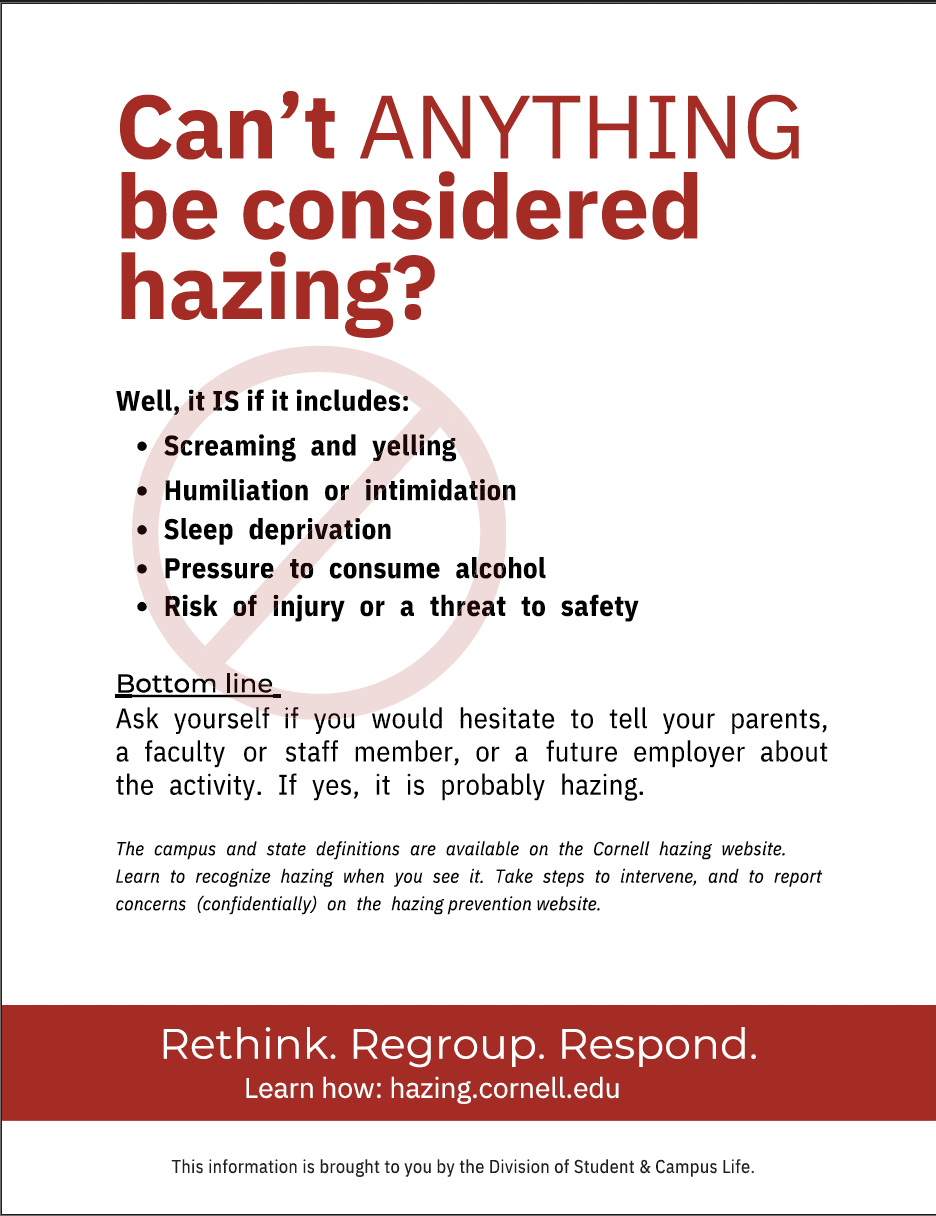Definitions
Hazing is prohibited by the Cornell Student Code of Conduct, New York State Law, and by the U.S. federal “Stop Campus Hazing" law).
University Definition of Hazing
According to the Cornell Student Code of Conduct and Weill Cornell Medical College’s policy on hazing:
Hazing is any act that, as an explicit or implicit condition of recruitment, admission, or initiation into, affiliation with, or new or continued membership status within a group, team, organization,
living group, or academic group or cohort, does one or more of the following:
- Causes, encourages, or compels another person to engage in any activity that could reasonably be perceived as likely to create a risk of mental, physical, or emotional distress or harm; examples include but are not limited to:
a. Undertake acts of servitude or menial tasks;
b. Undergo undue financial expenditures;
c. Engage in acts relevant to those of the group (for example practice or training activities), but in a manner that a reasonable person would consider excessive or dangerous;
d. Abuse, humiliate, degrade, or taunt another person or persons.
- Involves any of the following:
a. Consumption of alcohol or drugs;
b. Consumption of unpalatable substances, or palatable substances to excess;
c. Damage to or theft of property, or any other illegal act;
d. Violation of any University policy.
- Subjects any other person (including an existing member or cohort of existing members of the group) to any of the above activities.
Hazing can occur on or off campus, in person or in virtual settings. The individual subjected
to hazing does not need to regard or identify the act as hazing. The fact that an individual does not
object to and/or appears willing to participate in the activity, does not signify the conduct is not
hazing.
Examples of hazing
Joining a group should never involve:
- sleep deprivation
- eating gross stuff
- acts of exertion
- isolation from the group
- acts of servitude
- alcohol
Context matters
Note: while some behaviors constitute hazing regardless of context (e.g., paddling, use of alcohol), others depend on the circumstances. For example, requiring athletes to perform normal calisthenics as part of conditioning would not be hazing, but requiring new members of a non-athletic student organization to do push-ups in the middle of the night would constitute hazing.
Hazing can result in a range of sanctions against organizations/teams and individuals that range from educational interventions to suspension or expulsion.
Examples of hazing
Joining a group should never involve:
- sleep deprivation
- eating gross stuff
- acts of exertion
- isolation from the group
- acts of servitude
- alcohol
New York State Definitions & Penalties
According to NY State Penal Law, Chapter 716, Section 1:
120.16: Hazing in the first degree
A person is guilty of hazing in the first degree when, in the course of another person's initiation into or affiliation with any organization, he intentionally or recklessly engages in conduct which creates a substantial risk of physical injury to such other person or a third person and thereby causes such injury.
Hazing in the first degree is a class A misdemeanor.
120.17: Hazing in the second degree
A person is guilty of hazing in the second degree when, in the course of another person's initiation or affiliation with any organization, he intentionally or recklessly engages in conduct which creates a substantial risk of physical injury to such other person or a third person.
Hazing in the second degree is a violation.
Civil Penalties
Members and their parents, group leaders/advisors, as well as their organization and national affiliates may be sued in civil court for mental or physical harm that results from hazing. Hazing on college campuses has resulted in numerous successful lawsuits.
Federal Definition of Hazing
The Stop Campus Hazing Law defines hazing for the purposes of reporting statistics on hazing incidents in the Annual Security Report (ASR) as:
“Any intentional, knowing, or reckless act committed by a person (whether individually or in concert with other persons) against another person or persons regardless of the willingness of such other person or persons to participate, that –
Is committed to the course of an initiation into, an affiliation with, or the maintenance of membership in, a student organization; and
Causes or creates risk, above the reasonable risk encountered in the course of participation in the institution of higher education or the organization (such as the physical preparation necessary for participation in an athletic team), of physical or psychological injury including --
Whipping, beating, striking, electronic shocking, placing of a harmful substance on someone’s body, or similar activity;
Causing, coercing, or otherwise inducing sleep deprivation, exposure to the elements, confinement in a small space, extreme calisthenics, or other similar activity;
Causing, coercing, or otherwise inducing another person to consume food, liquid, alcohol, drugs, or other substances;
Causing, coercing, or otherwise inducing another person to perform sexual acts;
Any activity that places another person in reasonable fear of bodily harm through the use of threatening words or conduct;
Any activity against another person that includes a criminal violation of local, State, Tribal, or Federal law; and
Any activity that induces, causes, or requires another person to perform a duty or task that involves a criminal violation of local, State, Tribal, or Federal law.”
It also defines a “student organization” for purposes of reporting hazing statistics in the Annual Security Report as:
“an organization at an institution of higher education (such as a club, society, association, varsity or junior varsity athletic team club sports team, fraternity, sorority, band, or student government) in which two or more of the members are students enrolled at the institution of higher education, whether or not the organization is established or recognized by the institution.”
- View or print our current "Can't anything be considered hazing?" poster (CU NetID required)
- Review other hazing campaign materials from Cornell Health (CU NetID required)


